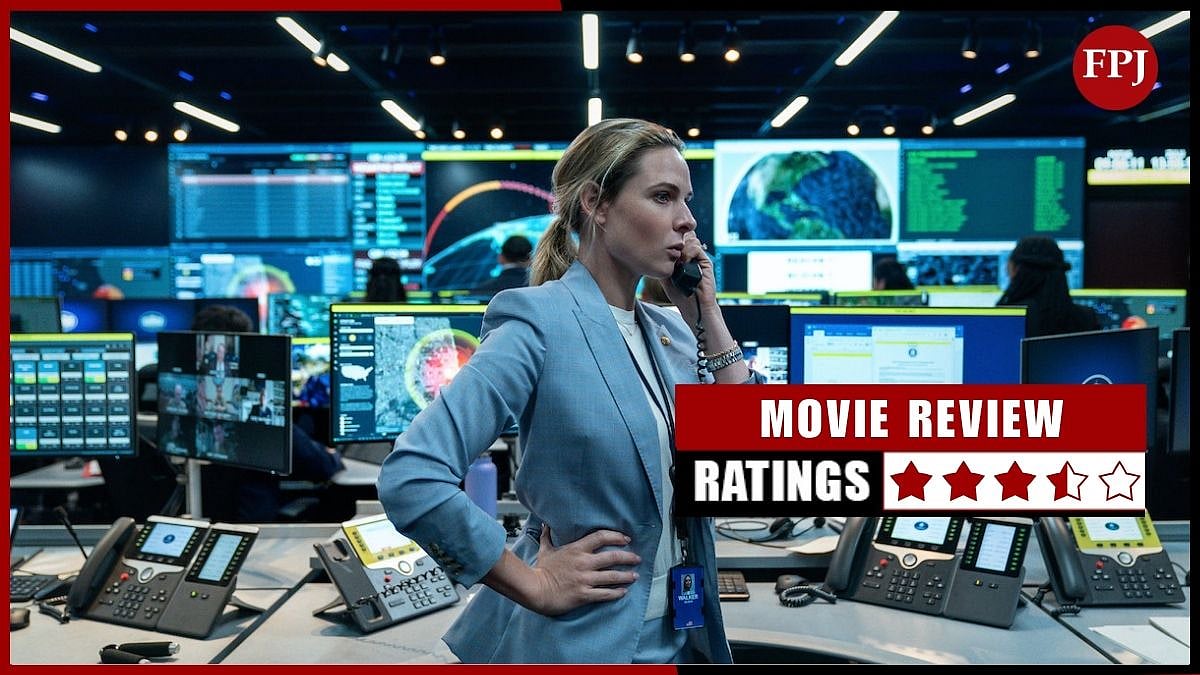Title: A House of Dynamite
Director: Kathryn Bigelow
Cast: Idris Elba, Rebecca Ferguson, Gabriel Basso
Where: Netflix
Rating: 3.5 stars
What will happen to a nation’s highest decision-makers when they can see a nuclear bomb headed toward them? Kathryn Bigelow, the Oscar-winning filmmaker who gave us The Hurt Locker and Zero Dark Thirty, combines procedural precision with real-time urgency to create a nerve-wracking experience.
A House of Dynamite is about an 18-minute window, replayed and re-enacted from the perspectives of its key characters, where decisions with catastrophic consequences must be made. An unauthorized launch of a nuclear weapon from the Pacific is heading to Chicago. Millions will die as America’s top military and government personnel scramble to deal with impending doomsday and diffuse the weapon. As Bigelow lays bare the processes that reveal the uncertainty of managing a possible nuclear strike, one is reminded of the razor’s-edge tension of her previous films, The Hurt Locker and Zero Dark Thirty. Built on a taut, unrelenting screenplay by Noah Oppenheim, the film thrives on uncertainty. It highlights the impossible choices faced by the U.S. president and the fallibility of the world’s most advanced military when confronted with total annihilation. As each passing minute demands urgency, the film recounts this phase from different points of view, reaffirming the vulnerability of human beings in the face of nuclear war. In a departure from standard Hollywood terminology—where NorthCom, StratCom, and the White House Situation Room often symbolize the solid power of American defense—here, the characters are vulnerable and exposed.
The film’s title shows up on screen at mid-point, reiterating the similarity between the United States and an easily combustible, dangerous living space. That is its central point, where a single mis-step could mean that so much goes wrong. Bigelow’s film is a contemporary interpretation of the moral dilemma and unwinnable condition of war that classics like Sidney Lumet’s Fail Safe and Stanley Kubrick’s Dr. Strangelove explored. But the theme of repeating the same chunk of time becomes repetitive. In showing the challenges that each character faces while making decisions, the film loses some of its urgency. Bigelow seems to make a personal statement against nuclear weapons, juxtaposed in the present day, where the rules of engagement between superpowers have changed. The
procedural approach, while accurate, begins to feel a bit mechanical toward the end, falling short of the standard set by the rest of the film.
Actors’ performance
Rebecca Ferguson is the most effective performer in the cast, appearing right at the start of the film when tensions are felt most deeply. Idris Elba is charming, but this role is perhaps a walk in the park for someone with his range. Tracy Letts, as a military general who must stay calm while asserting the role of force, is very convincing, as is Gabriel Basso as a young deputy national security adviser and voice of reason. As is often seen in the director’s films, it is the cast of lesser-known character actors who sustain the tightly wound tension by delivering strong performances. It is the treatment of the film—leading to a lukewarm climax through a simmering mood—that will engage the audience till the end. While the procedural elements are well executed and the accuracy of research is evident, the film misses the emotional quotient in a few moments. What it does convey effectively is that annihilating the human race today is just the push of a button away.

FPJ verdict
A House of Dynamite is meant for those that like a good thriller or an intelligent military drama. It is also a decent refresher course for our times, as conflict and global tensions keep ebbing and flowing around us.





